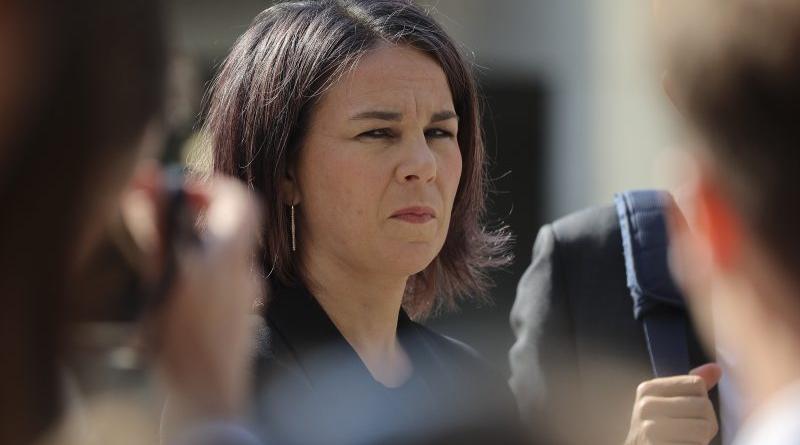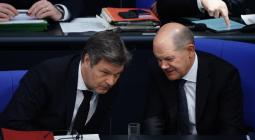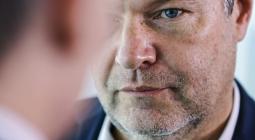Germany’s Baerbock preaches coal exit to reluctant South Africa

Germany is pushing South Africa to phase out coal as agreed, despite domestic opposition to the planned mothballing of aged power plants amid repeated power outages in the African country.
Germany’s Foreign Minister Annalena Baerbock visited Johannesburg on Tuesday (27 June) in a bid to persuade South Africa to join the international chorus of condemnation against Russia for its war on Ukraine.
She was also keen to remind Pretoria about its commitment to ditch coal as quickly as possible.
“Probably the biggest drag currently holding South Africa back from realising its full potential is the energy crisis in the country,” Baerbock told the press in Johannesburg on Tuesday.
The country is in the midst of a full-blown energy crisis, because of its failing fleet of ageing coal power plants. South Africa’s lights regularly flicker these days, prompting energy suppliers to start off diesel-powered generators in a bid to restore a semblance of normality.
Planned power cuts, or “load shedding” as they are called, often last for up to ten hours, at an enormous cost to the economy. Estimates suggest that South Africa’s GDP was 5% lower than it could have been in 2022 due to power cuts. And state-run utility company ESKOM has already warned that the coming winter may be worse.
The situation has put the wind in the sails of South Africa’s coal lobby, which argues that the energy crisis – caused by mismanaged power stations and rampant corruption – could be fixed with more coal.
Coal currently provides more than 80% of South Africa’s electricity, making it one of the most coal-intensive countries in the world. And the energy crisis is pushing politicians to consider keeping old coal plants running instead of shutting them down.
“In some cases, it may be necessary to re-examine the timeframe and the process of decommissioning or mothballing of coal-fired power stations temporarily to address our electricity supply shortfall,” Cyril Ramaphosa, South Africa’s president, said in April.
Climate activists, who hoped that the energy crisis could boost the transition to cleaner energy sources like renewables, are increasingly dismayed at the persistent coal lobbying.
The G7, a club of the world’s richest nations, has a special interest in South Africa going clean.
Pretoria was the first recipient of a new $8.5 billion scheme as part of the endeavour to help the Global South reduce its carbon emissions through “Just Energy Transition Partnerships”, a financing mechanism put together by wealthy nations.
Germany has been a vocal supporter of these schemes, having struggled for decades with efforts to reduce the share of coal in its own electricity mix.
“We know from our experience,” that a transformation like “a coal phase-out is not a matter of course, but a Herculean task,” Baerbock explained.
President Ramapahosa declined to meet with the German minister during her visit.
Since then, Indonesia and Vietnam have signed similar agreements, while the Philippines, Senegal, and India are in talks to join the scheme.
Western arrogance
Western politicians walk a tightrope when visiting South Africa as their efforts to boost the green transition are often seen as attempts to restore colonial structures.
“A new form of colonialism is introduced through the back door” is a common sentiment, according to the German research institute DIW. After all, the technologies that further a green transition are often produced in rich countries, and engagement is seen as a form of selfish market creation, the researchers said.
Critics also argue that Germany itself turned back to coal in the face of gas shortages last year.
“Yes, we had to temporarily reactivate a handful of coal plants we had held in reserve, to keep families warm in the freezing winter,” Baerbock admitted in an opinion piece published in the South African Sunday Times ahead of her visit.
Still, she upheld the importance of shutting down South Africa’s coal plants during her visit, a message that did not always go down well in Johannesburg.
Jacob Maroga, the former CEO of South Africa’s electricity utility ESKOM, once told Europe and the US to “shut up” when it comes to tackling climate change, given their historical emissions.
Hydrogen promises
One large promise made by Berlin to goad South Africa into boosting its energy transition is the promise of a future hydrogen economy.
“From my perspective, South Africa is in a unique position to benefit from the green hydrogen boom,” Baerbock wrote in the Op-Ed. Europe is thirsty for green hydrogen produced from renewable energy, and countries like Germany are “willing to pay a lot of money for it,” she added.
To underpin this promise, Germany signed a €30 million hydrogen deal with Johannesburg on Tuesday.
The agreement, which would see South Africa produce green hydrogen and its derivates – green kerosene and ammonia – includes a clause to ease “access to markets,” the German government said.
cover photo:Berlin is fighting for South Africa to stay on track to phase out coal as agreed. [EPA-EFE/JULIEN WARNAND]





